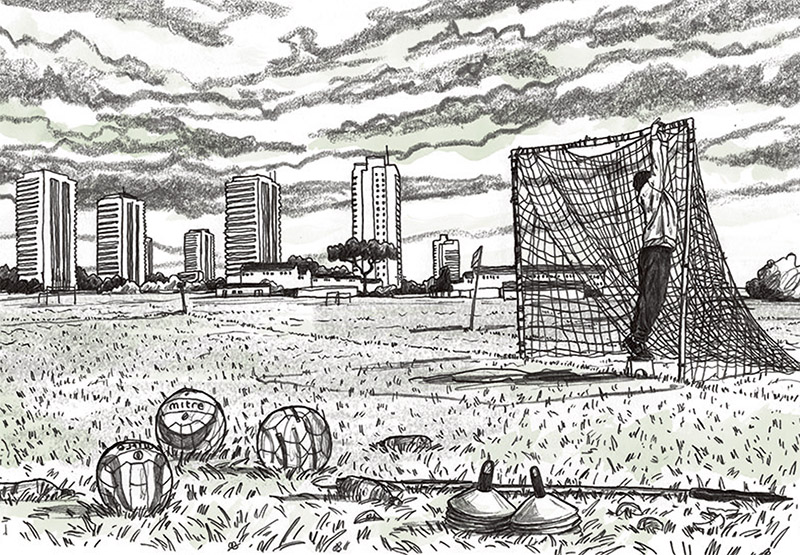
We are now accepting entries for the 2018 WSC writers’ competition. By way of inspiration, here is Jem Stone’s winning entry from 2017, about life as a youth coach after he reluctantly volunteered to help out
5 March ~ Five years ago my son’s under-tens football team were about to fold. The two previous managers, a couple of football-mad teenagers, had decided to give it up. Who could blame them? Not many lads find the time to run 30 training sessions a year with 15 or so boisterous Year 5s on cold, wet Monday nights in winter. Fewer still are willing to get out of bed on Sunday mornings to drive all over Sussex to watch a team play league matches for which the word “drubbing” was invented. And nobody wants to spend hours filling out incomprehensible online forms with stats to avoid the club getting petty fines from the FA. We once had to cough up £20 because I’d listed only eight players on our teamsheet when there should have been nine. Thanks, FA.
I used to be a rubbish football dad. When I dropped my lad off at training I sometimes perched on a wall reading the paper, drinking tea out of a flask instead of looking up to watch him play. He once abandoned football altogether for a few months because he was so angry at my lack of interest.
For some reason it had never occurred to me that the confident coach over there articulating the merits of 4-5-1 to gangly 15-year-olds, another handing out bags of kit, balls and bibs from his van, and a bloke in a club jacket grumpily hoovering up mud in the clubhouse were actually just other dads helping out years after putting themselves forward. Mere volunteers. I think I must have thought there were legions of trained managers and coaches out there kicking their heels just waiting for the call-up.
So I was perplexed at being invited for a pint with other parents a few years back to discuss the future of the under-tens. Was a new manager going to be revealed? Actually the chat was a bit more mundane. The shortlisted candidates for the job were the parents who’d bothered to turn up for this drink in the pub. Me included. This is all you need to do said the chairman, and manager of the under-15s, and fixtures secretary. Mostly something to do with bibs, cones and sending out a few emails. We all then started fidgeting and offering up reasons why we couldn’t possibly. Our fitness, “haven’t played football for years”, jobs, weekends and injuries we didn’t like to talk about. And then a sigh of relief all round. Some fool in a quiet voice finally said “I’ll do it, for a few weeks… until we find someone else”. That fool was me and we never did find anyone else. I’ve now been doing it for five years.
I thought I’d spend a lot of time actually coaching and I did once spend a weekend in Brighton sitting in a secondary school classroom for the first time in 30 years with other dads and teenage lads to earn a level one football qualification. “I hope you’re going to wear boots tomorrow,” scorned the instructor who taught me to be an expert at pass-and-move drills such as “traffic lights” and “round the clock”.
What I quickly learned was you can spend Saturday nights ringing up random phone numbers trying to find an emergency referee. You discuss the annual Lads v Dads match in an empty pub on a Wednesday night, with the rest of the committee, aka other volunteers, and pick the numbers for the club lottery – first prize: £36.50. You spend Sunday mornings with a spade and a leaky bucket filling in rabbit holes with the mud from molehills. You learn how to mark out a football pitch with string, diluted paint and the use of right angles. You sit at your kitchen table in August with a pair of scissors, dozens of passport photos, two jumbo Pritt Sticks and multiple forms to create league registration cards. You then have to show these off before every match to prove to your sceptical opponents that your strapping six-foot-tall 12-year-old is still in Year 8. You can put up nets on all size of pitches but someone will keep nicking the pegs from the bag.
You start every training session pumping up footballs, but will always lose one by the end. You really do cut up oranges into quarters and hand them out at half time. You’ll start to find bags of odd kit all over your house, in the shed, under the bed and in the back of the car. You send dozens of emails, texts and Facebook messages a week keeping everyone informed with dull updates usually containing the words “GAME OFF” as another weather forecast puts paid to your pitch.
Those first few sessions where the parents waved goodbye, the boys gather in front of you and it’s 14 football-mad lads expecting José Mourinho but getting Eric Morecambe were the worst. How do you get them to even stand still? I had simply no idea. It was miserable some nights.
You end up running the show. The football bit and especially my son was, as it turns out, just the excuse to get things done. Sometimes you need the football bit as the prompt to start anything; writing, getting fit, making friends and chucking dog poo in a bucket pre-dawn before putting up the corner flags.
But gradually several dads, perhaps relieved they wouldn’t have the burden of doing the dull stuff, started turning up in their football boots lurking. One started taking drills with our goalkeeper and in the second season eventually took over the warm up while I chatted to parents and collected money. A young lad, who’d had his fingers burnt managing a team a few years back, was happier coaching the odd session as it was someone else’s team, and enjoyed – indeed was rather good at it – refereeing our games.
Now in my fifth year I’ve assembled a team up there with the famous boot room, or whatever the equivalent might be for the glorious heights of the Sussex Sunday Youth League Division Five. We’ve had the odd row. We often disagree. But they are also great friends. If it was still me, by myself, standing alone handing out the bibs I’d have resigned years ago.
There are over 5,000 players registered in the Sussex Sunday Youth League this season and hundreds of teams, yet many this winter have been sitting idle on Sunday mornings. I’ve ended up being the manager of a football team that doesn’t play football matches. Two of the wettest winters on record in recent seasons hasn’t helped but an FA survey correctly described the current state of facilities as “chronic”. Waterlogged pitches are the norm and the accepted solution, a nation committed to plastic all-weather 3G pitches, are £500,000 a pop to install, maintain and manage.
Yet. Yet. The Premier League, which has TV contracts worth over £8 billion in its pocket, currently donates a paltry £12 million a year to grassroots facilities. The FA, seemingly incapable of forcing a better deal, likes to portray its minimal investment as groundbreaking and its slow progress in grassroots (the respect programme, small-sized pitches/teams, not reporting results for under-11s) is too late for the lads in Sussex lying on their sofas having received an email from me entitled “GAME OFF” after I’ve trudged on the Common in the rain.
When I was 11, I was obsessed. I really did kick a ball about in the street, by myself. My local team though had trials to select players, because as I now realise they didn’t have enough coaches or dads. I didn’t make it and barely kicked a ball again for 30 years.
So although I can’t fix the waterlogged pitches, I deliberately don’t turn away players. A poor defender at ten years old can develop and be your box-to-box midfielder in a few years. For teenagers with multiple distractions, then keeping a team playing is an achievement in itself. So if I’m sitting down with the Pritt Stick in August and have 18 players registered for 2017-18 then job done for the manager. Until we find someone else of course. Jem Stone
Click here to find out how to enter the 2018 WSC writers’ competition – there is a £250 cash prize for the winner, whose article will be published in WSC this summer
Illustration by David Sparshott

